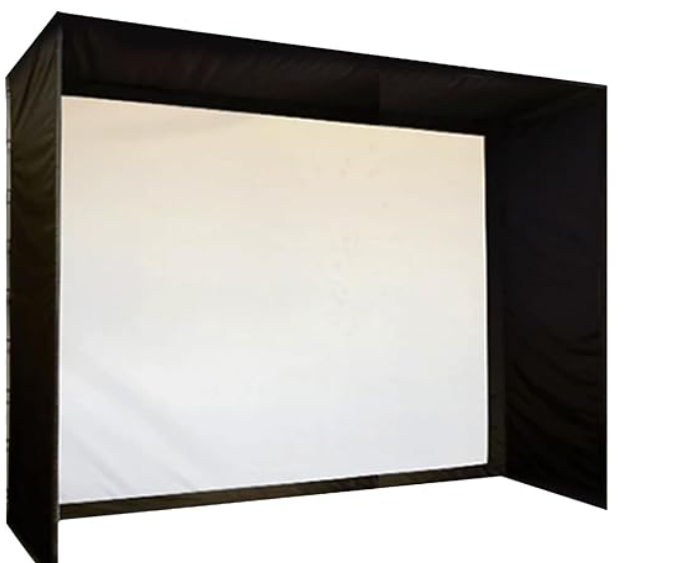Building or buying a golf simulator enclosure can make a significant difference in your indoor golfing experience. Here’s a detailed breakdown of both DIY and full-enclosure options to help you understand their strengths and weaknesses.
DIY Golf Simulator Enclosures
Pros:
- Cost-Effective: The most significant advantage of going DIY is the cost savings. Buying the materials yourself is often cheaper than purchasing a pre-made kit.
- Customizable: You can tailor the enclosure to your specific space and preferences. This includes the size, screen quality, netting, and even the design of the frame.
- Learning Opportunity: DIY allows you to better understand the technicalities of a golf simulator enclosure, which can help with future repairs or upgrades.
- Satisfaction of Creation: For DIY enthusiasts, there’s a sense of accomplishment in building something yourself.
Cons:
- Time-Consuming: Building an enclosure from scratch requires research, planning, and a lot of time to put together.
- Room for Error: If you’re not experienced with construction, you might end up with structural issues that could affect safety or screen performance.
- Material Sourcing: Finding the right materials, such as impact screens, netting, and a durable frame, can be tricky and sometimes more expensive than expected.
- No Warranty: If something goes wrong, there’s no warranty to fall back on, which can increase long-term costs.
Recommended for: Golfers who have a knack for DIY projects, are on a budget, or need a custom size to fit a specific room.
Materials:
- Impact Screen: High-quality material like polyester or mesh for durability.
- Netting: To catch missed shots, this can be made from strong polyethylene or nylon.
- Frame: PVC pipes, metal poles, or wood are common for building a sturdy frame.
- Turf: For a realistic feel underfoot, you can lay down artificial grass or turf.
Full Golf Simulator Enclosures (Pre-Made Kits)
Pros:
- Convenience: These kits come pre-designed with all the necessary components, so you don’t have to spend time planning or sourcing materials.
- Professional Quality: Many commercial kits are engineered for durability, safety, and performance, often providing better impact screens and framing materials than DIY options.
- Quick Setup: Most full enclosures are designed for easy assembly, which saves time compared to DIY.
- Warranty & Support: Many pre-built enclosures come with warranties and customer support, which is valuable if something goes wrong.
- Aesthetic Appeal: They usually look more polished and professional, with better finishes and attention to detail.
Cons:
- Expensive: Full simulator enclosures are significantly more expensive than DIY setups. The cost can range from a few thousand dollars to over $10,000 depending on the size, screen quality, and features.
- Limited Customization: You’re limited to the design and specifications of the kit, which might not fit perfectly in your space.
- Shipping Costs: Larger enclosures can come with hefty shipping fees due to their size and weight.
Recommended for: Golfers who want a hassle-free, professional solution with minimal setup effort and don’t mind paying a premium for quality and convenience.
Popular Brands:
- Carl’s Place: Known for high-quality screens and enclosures that are fairly easy to assemble.
- SkyTrak: Offers comprehensive simulator kits that include everything from the screen to the projector.
- Foresight Sports: Premium option for those looking for top-tier technology integration with their enclosure.
Comparison Summary:
| Feature | DIY Enclosure | Full Enclosure |
|---|---|---|
| Cost | Lower cost, depending on materials | More expensive, premium pricing |
| Customization | High customization potential | Limited customization |
| Build Time | Time-consuming | Quick setup |
| Material Quality | Depends on sourcing | Typically high quality |
| Support/Warranty | No warranty or customer support | Comes with warranty and support |
| Aesthetic | Variable depending on skills | Professional finish |
Final Thoughts:
- DIY is ideal if you’re handy, want to save money, and have a specific space that needs customization. It’s more rewarding but requires more time, effort, and attention to detail.
- Full Enclosures are perfect for those looking for a hassle-free experience, willing to pay for quality and support, and want a more professional setup.
Your choice depends on your budget, available time, and how important quality and aesthetics are for your setup.
For additional information, click here.

